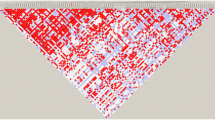Abstract
The aim of this study is to determine the roles of eNOS gene variations in BCA development. Our study included 91 patients diagnosed with BCA and 91 healthy controls. eNOS 4VNTR (4a/b), T786C and G894T gene variations genotype distributions were determined by PCR and RFLP methods. The significant difference was determined between these groups in terms of eNOS T786C and eNOS G894T gene variations genotype distributions (p < 0.05). TT genotype for G894T gene variation and CC genotype for T786C gene variation were detected higher in patients. The CC genotype of T786C gene variation was detected significantly higher in male patients than in male controls (p < 0.05). In addition, aa-TT, ab-TT, bb-TT haplotypes of 4VNTR (4a/b)-G894T gene variations, aa-CC, ab-CC, bb-CC haplotypes of 4VNTR (4a/b)-T786C gene variations and TT-TT, TT-CC, TT-CT, GG-CC, GT-CC haplotypes of G894T-T786C gene variations were observed in patient group more than control group. The significant difference was detected between these groups in terms of eNOS (G894T-T786C) haplotypes (p < 0.05). In our study, eNOS T786C and eNOS G894T gene variations were determined important genetic risk factor in the Thrace population of Turkey.

Similar content being viewed by others
Data Availability
Data sharing not applicable to this article.
References
Toker A, Erkan E, Hocaoglu Emre FS, Yucetas U. eNOS gene polymorphisms and transitional cell cancer of the bladder. Ann Med Res. 2020;27(7):2004–10. https://doi.org/10.5455/annalsmedres.2020.01.039.
Nan J, Liu Y, Xu C, Ge D. Effects of eNOS gene polymorphisms on individual susceptibility to cancer: a meta-analysis. Nitric Oxide. 2019;84:1–6. https://doi.org/10.1016/j.niox.2018.12.006.
Polat F, Diler SB, Azazi İ, Öden A. T-786C, G894T, and intron 4 VNTR (4a/b) polymorphisms of the endothelial nitric oxide synthase gene in bladder cancer cases. Asian Pac J Cancer Prev. 2015;16(6):2199–202. https://doi.org/10.7314/apjcp.2015.16.6.2199.
Salimian Rizi B, Achreja A, Nagrath D. Nitric oxide: the forgotten child of tumor metabolism. Trends Cancer. 2017;3(9):659–72. https://doi.org/10.1016/j.trecan.2017.07.005.
Luanpitpong S, Chanvorachote P. Nitric oxide and aggressive behavior of lung cancer cells. Anticancer Res. 2015;35(9):4585–92.
Burke AJ, Sullivan FJ, Giles FJ, Glynn SA. The yin and yang of nitric oxide in cancer progression. Carcinogenesis. 2013;34(3):503–12. https://doi.org/10.1093/carcin/bgt034.
Choudhari SK, Chaudhary M, Bagde S, Gadbail AR, Joshi V. Nitric oxide and cancer: a review. World J Surg Oncol. 2013;30(11):118. https://doi.org/10.1186/1477-7819-11-118.
Raina P, Sikka R, Gupta H, Matharoo K, Bali SK, Singh V, et al. Association of eNOS and MCP-1 genetic variants with type 2 diabetes and diabetic nephropathy susceptibility: a case-control and meta-analysis study. Biochem Genet. 2021;59(4):966–96. https://doi.org/10.1007/s10528-021-10041-2.
Abbasi H, Dastgheib SA, Hadadan A, Karimi-Zarchi M, Javaheri A, Meibodi B, et al. Association of endothelial nitric oxide synthase 894G > T polymorphism with preeclampsia risk: a systematic review and meta-analysis based on 35 studies. Fetal Pediatr Pathol. 2021;40(5):455–70. https://doi.org/10.1080/15513815.2019.1710880.
Bayraktutan Z, Kiziltunc A, Bakan E, Alp HH. Determination of endothelial nitric oxide synthase gene polymorphism and plasma asymmetric dimethyl arginine concentrations in patients with lung cancer. Eurasian J Med. 2020;52(2):185–90. https://doi.org/10.5152/eurasianjmed.2020.19220.
Adibmanesh A, Bijanzadeh M, Mohammadzadeh G, Alidadi R, Rashidi M, Talaizadeh A. The correlation of endothelial nitric oxide synthase gene rs1799983 polymorphisms with colorectal cancer. Int J Cancer Manag. 2020;13(5):e97220. https://doi.org/10.5812/ijcm.97220.
Abedinzadeh M, Dastgheib SA, Maleki H, Heiranizadeh N, Zare M, Jafari-Nedooshan J, et al. Association of endothelial nitric oxide synthase gene polymorphisms with susceptibility to prostate cancer: a comprehensive systematic review and meta-analysis. Urol J. 2020;17(4):329–37. https://doi.org/10.22037/uj.v0i0.5445.
Azuma S, Uojima H, Chuma M, Shao X, Hidaka H, Nakazawa T, et al. Influence of NOS3 rs2070744 genotypes on hepatocellular carcinoma patients treated with lenvatinib. Sci Rep. 2020;10(1):17054. https://doi.org/10.1038/s41598-020-73930-3.
Ay A, Alkanli N, Cevik G. Investigation of the relationship between MMP-1 (-1607 1G/2G), MMP-3 (-1171 5A/6A) gene variations and development of bladder cancer. Mol Biol Rep. 2021;48:7689–95. https://doi.org/10.1007/s11033-021-06775-2.
Günel T, Göksever Çelik H, Diz Kücükkaya R, Alkaç İM, Aydınlı K. Molecular mechanisms of endothelial function and dysfunction in human diseases. İKSSTD. 2020;12(3):201–16. https://doi.org/10.5222/iksstd.2020.61587.
Tsay MD, Hsieh MJ, Wang SS, Wang WC, Chou YY, Shih CH, Yang SF, Chou YE. Impact of endothelial nitric oxide synthase polymorphisms on urothelial cell carcinoma development. Urol Oncol. 2019;37(4):293.e1-293.e9. https://doi.org/10.1016/j.urolonc.2018.12.023.
Ying L, Hofseth LJ. An emerging role for endothelial nitric oxide synthase in chronic inflammation and cancer. Cancer Res. 2007;67(4):1407–10. https://doi.org/10.1158/0008-5472.CAN-06-2149.
Oliveira-Paula GH, Lacchini R, Tanus-Santos JE. Clinical and pharmacogenetic impact of endothelial nitric oxide synthase polymorphisms on cardiovascular diseases. Nitric Oxide. 2017;63:39–51. https://doi.org/10.1016/j.niox.2016.08.004.
Levine AB, Punihaole D, Levine TB. Characterization of the role of nitric oxide and its clinical applications. Cardiology. 2012;122(1):55–68. https://doi.org/10.1159/000338150.
Dhananjayan R, Koundinya KS, Malati T, Kutala VK. Endothelial dysfunction in type 2 diabetes mellitus. Indian J Clin Biochem. 2016;31(4):372–9. https://doi.org/10.1007/s12291-015-0516-y.
Eghlim FF, Ashavaid TF, Nair KG. Genetic determinants of hyperhomocysteinemia in atherosclerosis. Indian J Clin Biochem. 2006;21(2):4–11. https://doi.org/10.1007/BF02912904.
Rishiraj U, Rohilla S, Kaur S. Correlation between intron 4 polymorphism of the endothelial nitric oxide synthase gene and cardiovascular risk with the numbers of circulating endothelial progenitor cells in healthy subjects. Indian J Clin Biochem. 2018;33(2):202–7. https://doi.org/10.1007/s12291-017-0662-5.
Amasyali AS, Kucukgergin C, Erdem S, Sanli O, Seckin S, Nane I. Nitric oxide synthase (eNOS4a/b) gene polymorphism is associated with tumor recurrence and progression in superficial bladder cancer cases. J Urol. 2012;188(6):2398–403. https://doi.org/10.1016/j.juro.2012.07.096.
Arıkan S, Cacina C, Guler E, Çulcu S, Tuna G, Yaylım-Eraltan I. The effects of NOS3 Glu298Asp variant on colorectal cancer risk and progression in Turkish population. Mol Biol Rep. 2012;39(3):3245–9. https://doi.org/10.1007/s11033-011-1092-8.
Lembo G, De Luca N, Battagli C, Iovino G, Aretini A, Musicco M, et al. A common variant of endothelial nitric oxide synthase (Glu298Asp) is an independent risk factor for carotid atherosclerosis. Stroke. 2001;32(3):735–40. https://doi.org/10.1161/01.str.32.3.735.
Verim L, Toptas B, Ozkan NE, Cacina C, Turan S, Korkmaz G, et al. Possible relation between the NOS3 gene GLU298ASP polymorphism and bladder cancer in Turkey. Asian Pac J Cancer Prev. 2013;14(2):665–8. https://doi.org/10.7314/apjcp.2013.14.2.665.
Ryk C, Wiklund NP, Nyberg T, de Verdier PJ. Polymorphisms in nitric-oxide synthase 3 may influence the risk of urinary-bladder cancer. Nitric Oxide. 2011;25(3):338–43. https://doi.org/10.1016/j.niox.2011.06.003.
Acknowledgements
This study was performed in departments of Biophysics and Urology in Faculty of Medicine in Trakya University.
Funding
This study was not supported by any specific grant from funding.
Author information
Authors and Affiliations
Contributions
All authors contributed to the study conception and design. Material preparation, data collection and analysis were performed by [NA], [AA], and [GC]. All authors approved the final manuscript. The corresponding author attests that all listed authors meet the authorship criteria and that no other authors meeting the criteria have been omitted.
Corresponding authors
Ethics declarations
Conflict of interest
The authors declare that they have no conflict of interest.
Ethical approval
For our study, ethics committee approval was obtained with the TÜTF-BAEK 2020/240 protocol code from Trakya University Faculty of Medicine Non-Invasive Clinical Research Ethics Committee.
Consent to participate
Signed informed consent form was collected from each individual in the patient group with BCA and healthy control group.
Consent to publish
Consent for publication is not required as no identifying personal information is published in this manuscript.
Additional information
Publisher's Note
Springer Nature remains neutral with regard to jurisdictional claims in published maps and institutional affiliations.
Rights and permissions
Springer Nature or its licensor holds exclusive rights to this article under a publishing agreement with the author(s) or other rightsholder(s); author self-archiving of the accepted manuscript version of this article is solely governed by the terms of such publishing agreement and applicable law.
About this article
Cite this article
Ay, A., Alkanli, N. & Cevik, G. Determination of the Roles of Endothelial Nitric Oxide Synthase 4VNTR (4a/b), G894T, T786C Gene Variations in the Bladder Cancer Development. Ind J Clin Biochem 39, 92–100 (2024). https://doi.org/10.1007/s12291-022-01090-4
Received:
Accepted:
Published:
Issue Date:
DOI: https://doi.org/10.1007/s12291-022-01090-4




